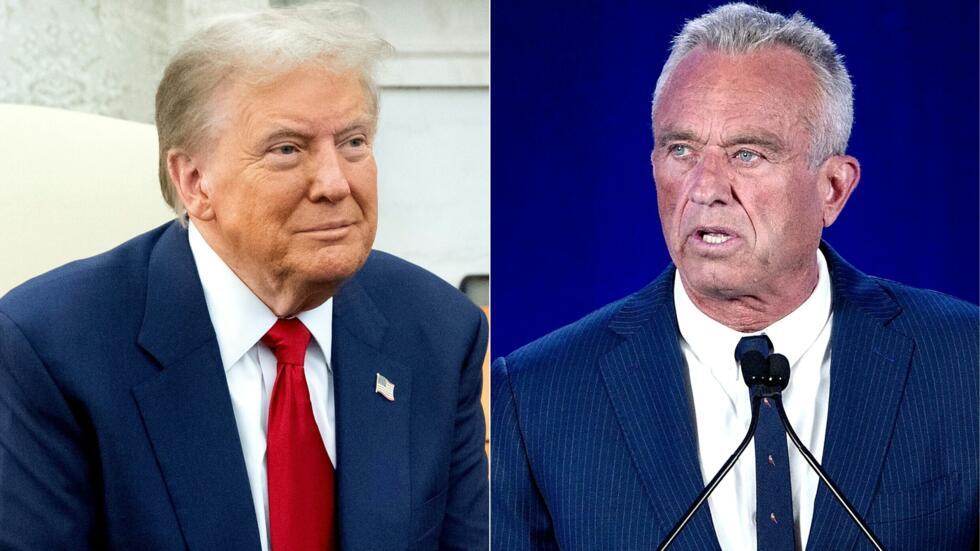
Donald Trump has selected Robert F. Kennedy Jr., a prominent vaccine skeptic and former independent presidential candidate, to serve as his health secretary, as the president-elect continues to build his administration.
Kennedy, widely known as RFK Jr., has been a controversial figure for years due to his outspoken stance on vaccines, which many scientists have criticized as promoting misinformation. If confirmed by the Senate, Kennedy will head the Department of Health and Human Services (HHS), a massive agency responsible for overseeing everything from food safety to medical research and public health programs.
Trump made the announcement on Thursday, part of a flurry of new nominations. The president-elect also confirmed his intention to nominate North Dakota Governor Doug Burgum as interior secretary, with a formal announcement expected on Friday. Burgum, a former businessman and one-time Republican presidential candidate, was previously mentioned in Trump’s election night victory speech as being tapped for a “very big position.”
Other new appointments announced Thursday include:
- Doug Collins (former Georgia Congressman) for Secretary of Veterans Affairs.
- Todd Blanche (Trump’s defense lawyer in his criminal trial) for Deputy Attorney General.
- Dean John Sauer (who represented Trump in a US Supreme Court case) as Solicitor General, responsible for overseeing government litigation before the Court.
- Jay Clayton (former SEC chair) as US Attorney for the Southern District of New York, one of the nation’s most influential federal courts.
In his statement, Trump expressed his enthusiasm about Kennedy’s nomination, saying, “I’m thrilled to announce that Robert F. Kennedy Jr. will lead the Department of Health and Human Services.” The president-elect noted Kennedy’s passion for tackling public health issues, particularly what he described as the “deception” by the pharmaceutical industry and the “industrial food complex.”
“For too long, Americans have been crushed by the deception of these powerful industries. Mr. Kennedy will restore HHS to its tradition of gold-standard scientific research and transparency, and fight to end the chronic disease epidemic,” Trump said, referring to Kennedy’s stance on the need for a more transparent and holistic approach to public health.
Kennedy, the son of assassinated US Attorney General Robert F. Kennedy and nephew of President John F. Kennedy, ran for president this year as an independent candidate after initially seeking the Democratic nomination. Though he suspended his campaign and later endorsed Trump, his controversial views on vaccines have made him a divisive figure. Kennedy has claimed that childhood vaccines contribute to autism, a position that contradicts the findings of multiple scientific studies. According to the Centers for Disease Control and Prevention (CDC), vaccines have not been shown to cause autism.
In addition to his vaccine views, Kennedy, who overcame a long battle with heroin addiction, has also advocated for solutions to America’s growing substance abuse crisis, as well as mental health issues like loneliness and despair.
Democrats quickly condemned the nomination, with Senator Patty Murray calling it “catastrophic” and labeling Kennedy a “fringe conspiracy theorist.” Republican Senator Susan Collins expressed concern over Kennedy’s views but said she would give him a fair hearing during Senate confirmation.
Trump has been busy filling key positions since his election victory. His party is projected to take control of the House of Representatives, giving Republicans the reins of both the White House and Congress. Among other controversial picks, Trump has nominated Florida Congressman Matt Gaetz, despite ongoing investigations into Gaetz’s conduct, including allegations of sexual misconduct and financial impropriety. Gaetz, who played a key role in ousting House Speaker Kevin McCarthy last year, has faced criticism even from within his own party.
Trump also provided more details about the role Elon Musk will play in his administration, saying Musk will head a new “Department of Government Efficiency,” which will issue reports aimed at streamlining federal operations.
As the new administration takes shape, all eyes will be on these nominations as they head to the Senate for confirmation.
4o mini
